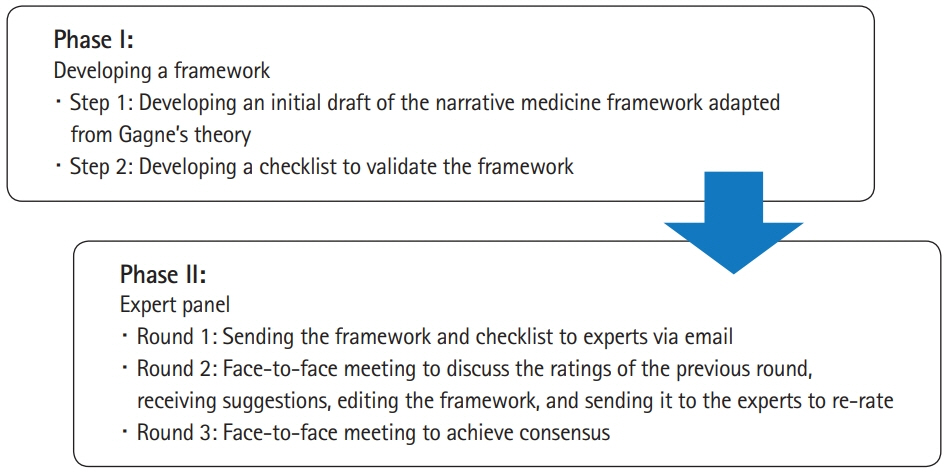J Educ Eval Health Prof.
2019;16:34. 10.3352/jeehp.2019.16.34.
Development of a checklist to validate the framework of a narrative medicine program based on Gagne’s instructional design model in Iran through consensus of a multidisciplinary expert panel
- Affiliations
-
- 1Department of Medical Education and Medical Education Research Center, Medical Education Development Research Center, Isfahan University of Medical Sciences, Isfahan, Iran
- 2Department of Internal Medicine, Research Center of Gastroenterology, Isfahan University of Medical Sciences, Isfahan, Iran
- KMID: 2502165
- DOI: http://doi.org/10.3352/jeehp.2019.16.34
Abstract
- Purpose
Narrative medicine is a patient-centered approach focusing on the development of narrative skills and self-awareness that incorporates “attending, representing, and affiliating” in clinical encounters. Acquiring narrative competency promotes clinical performance, and narratives can be used for teaching professionalism, empathy, multicultural education, and professional development. This study was conducted to develop a checklist to validate the framework of a narrative medicine program through consensus of a panel.
Methods
This expert panel study was conducted from 2018 to 2019 at Isfahan University of Medical Sciences, Iran. It included 2 phases: developing a framework in 2 steps and forming an expert panel to validate the framework in 3 rounds. We adapted a 3-stage narrative medicine model with 9 training activities from Gagne’s theory, developed a framework, and then produced a checklist to validate the framework in a multidisciplinary expert panel that consisted of 7 experts. The RAND/UCLA appropriateness method was used to assess the experts’ agreement. The first-round opinions were received by email. Consensus was achieved in the second and third rounds through face-to-face meetings to facilitate interactions and discussion among the experts.
Results
Sixteen valid indicators were approved and 100% agreement was obtained among experts (with median values in the range of 7–9 out of a maximum of 9, with no disagreement), and the framework was validated by the expert panel.
Conclusion
The 16 checklist indicators can be used to evaluate narrative medicine programs as a simple and practical guide to improve teaching effectiveness and promote life-long learning.
Figure
Cited by 1 articles
-
Impact of a narrative medicine program on reflective capacity and empathy of medical students in Iran
Saeideh Daryazadeh, Payman Adibi, Nikoo Yamani, Roya Mollabashi, Sun Huh
J Educ Eval Health Prof. 2020;17:3. doi: 10.3352/jeehp.2020.17.3.
Reference
-
References
1. Charon R. At the membranes of care: stories in narrative medicine. Acad Med. 2012; 87:342–347. https://doi.org/10.1097/ACM.0b013e3182446fbb.
Article2. Charon R, DasGupta S. Narrative medicine, or a sense of story. Lit Med. 2011; 29:vii–xiii.3. Shaw AC, McQuade JL, Reilley MJ, Nixon B, Baile WF, Epner DE. Integrating storytelling into a communication skills teaching program for medical oncology fellows. J Cancer Educ. 2018; Sep. 15. [Epub]. https://doi.org/10.1007/s13187-018-1428-3.
Article4. Charon R, Hermann N, Devlin MJ. Close reading and creative writing in clinical education: teaching attention, representation, and affiliation. Acad Med. 2016; 91:345–350. https://doi.org/10.1097/ACM.0000000000000827.
Article5. Huang CD, Liao KC, Chung FT, Tseng HM, Fang JT, Lii SC, Kuo HP, Yeh SJ, Lee ST. Different perceptions of narrative medicine between Western and Chinese medicine students. BMC Med Educ. 2017; 17:85. https://doi.org/10.1186/s12909-017-0925-0.
Article6. Milota MM, van Thiel GJ, van Delden JJ. Narrative medicine as a medical education tool: a systematic review. Med Teach. 2019; 41:802–810. https://doi.org/10.1080/0142159X.2019.1584274.
Article7. Atlas J. The principles and practice of narrative medicine, edited by Rita Charon, Sayantani DasGupta, Nellie Hermann, Craig Irvine, Eric Marcus, Edgar Rivera Colon, Danielle Spencer, and Maura Spiegel. Health Commun. 2017; 1–2. https://doi.org/10.1080/10410236.2017.1403828.
Article8. Ilie MD. An adaption of Gagne’s instructional model to increase the teaching effectiveness in the classroom: the impact in Romanian Universities. Educ Technol Res Dev. 2014; 62:767–794. https://doi.org/10.1007/s11423-014-9353-6.
Article9. Foth T, Efstathiou N, Vanderspank-Wright B, Ufholz LA, Dutthorn N, Zimansky M, Humphrey-Murto S. The use of Delphi and Nominal Group Technique in nursing education: a review. Int J Nurs Stud. 2016; 60:112–120. https://doi.org/10.1016/j.ijnurstu.2016.04.015.
Article10. Humphrey-Murto S, Varpio L, Gonsalves C, Wood TJ. Using consensus group methods such as Delphi and Nominal Group in medical education research. Med Teach. 2017; 39:14–19. https://doi.org/10.1080/0142159X.2017.1245856.
Article11. Wald HS, Borkan JM, Taylor JS, Anthony D, Reis SP. Fostering and evaluating reflective capacity in medical education: developing the REFLECT rubric for assessing reflective writing. Acad Med. 2012; 87:41–50. https://doi.org/10.1097/ACM.0b013e31823b55fa.
Article12. Saperstein AK, Lilje T, Seibert D. A model for teaching reflective practice. Mil Med. 2015; 180(4 Suppl):142–146. https://doi.org/10.7205/MILMED-D-14-00589.
Article13. Tsingos C, Bosnic-Anticevich S, Lonie JM, Smith L. A model for assessing reflective practices in pharmacy education. Am J Pharm Educ. 2015; 79:124. https://doi.org/10.5688/ajpe798124.
Article14. Reis SP, Wald HS, Monroe AD, Borkan JM. Begin the BEGAN (The Brown Educational Guide to the Analysis of Narrative): a framework for enhancing educational impact of faculty feedback to students’ reflective writing. Patient Educ Couns. 2010; 80:253–259. https://doi.org/10.1016/j.pec.2009.11.014.
Article15. Schartel SA. Giving feedback: an integral part of education. Best Pract Res Clin Anaesthesiol. 2012; 26:77–87. https://doi.org/10.1016/j.bpa.2012.02.003.
Article
- Full Text Links
- Actions
-
Cited
- CITED
-
- Close
- Share
- Similar articles
-
- The Development Study of a Medical Ethics Education Program by Using Simple ISD Model
- Development of an e-Learning Program about Medication for New Nurses
- HL7 Development Framework based on Object-oriented Analysis & a Design for Chemotherapy Order System
- Development and Evaluation of Learning Program for Oncology Unit-based Core Nursing Practice: Outcomes based Cancer Patients Pain Management Learning Program
- The Development and Effectiveness of a Web-based Instruction Program for Nursing Informatics


